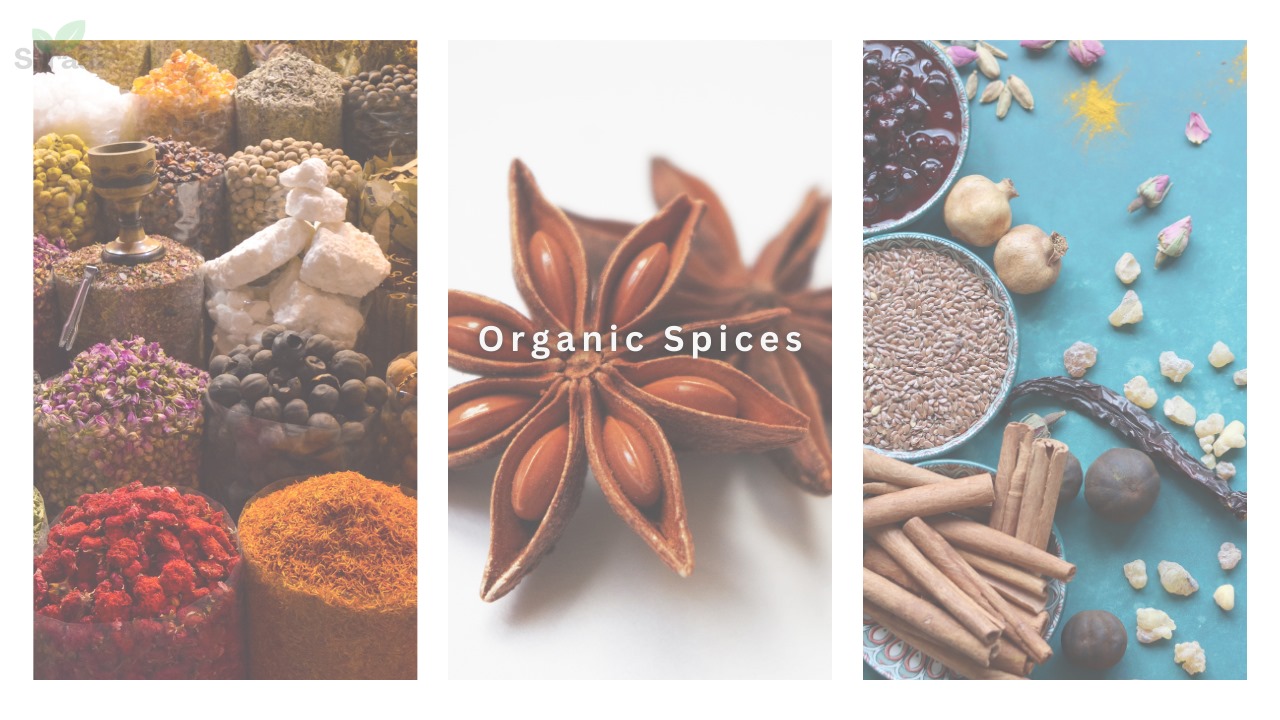Introduction to Organic Spices
Organic spices are gaining increasing popularity as people become more conscious of their health and the environment. Not only are they used to enhance the flavor of our dishes, but many organic spices also come with a range of medicinal benefits rooted in ancient traditions and supported by modern science. This article delves into lesser-known organic spices like fenugreek and cumin, highlighting their medicinal benefits, how to incorporate them into your daily diet, and their role in supporting overall wellness.
As more consumers move toward organic and sustainable living, understanding the significance of organic spices can help make informed choices for both culinary and health benefits. Organic spices, free from harmful pesticides and chemicals, offer a purer, more nutritious option for everyday use. Additionally, many of these spices have been used in traditional medicine for centuries to treat various ailments, from digestive issues to inflammation and more.
We will cover a wide range of topics, including what makes a spice organic, an in-depth look at specific lesser-known spices and their medicinal properties, the scientific perspective on how these spices benefit health, and tips for incorporating them into your meals.
For a broader discussion of the overall organic foods beyond just organic spices, check out The Complete Guide to Organic Food/Edibles: Benefits, Characteristics, and Future Trends.
What Makes Spices Organic?
Organic spices are grown without the use of synthetic fertilizers, pesticides, herbicides, and genetically modified organisms (GMOs). They are produced following strict standards that emphasize sustainable farming practices, soil fertility, and biodiversity. Organic certification bodies, such as USDA Organic and EU Organic, regulate and certify these products to ensure they meet the necessary criteria.
Key Differences Between Organic and Conventional Spices
When choosing between organic and conventional spices, several critical differences affect both health and the environment:
| Factor | Organic Spices | Conventional Spices |
| Pesticide Use | No synthetic pesticides; natural pest control methods are used. | May contain traces of synthetic pesticides. |
| Fertilizers | Organic fertilizers like compost and green manure are used. | Often grown with synthetic fertilizers. |
| GMO Content | Free from genetically modified organisms (GMOs). | May contain GMOs depending on the country of origin. |
| Environmental Impact | Promotes soil health, biodiversity, and sustainable farming. | May contribute to soil degradation, and water pollution. |
| Nutrient Content | Higher nutrient and essential oil content due to natural soil health. | Nutrient content may be lower due to chemical farming methods. |
Why Choose Organic Spices?
- Health Benefits
Organic spices are free from harmful chemicals that may have long-term effects on health, such as hormone disruption, allergies, and even cancer. By choosing organic, you reduce exposure to these toxins. - Better Flavor
Many food enthusiasts and chefs note that organic spices often have a stronger, richer flavor profile due to the lack of synthetic additives. Since they retain more essential oils, they can elevate the taste of a dish significantly. - Nutrient Density
Research has shown that organically grown plants may have higher levels of nutrients like vitamins and minerals. Organic spices tend to be richer in antioxidants and beneficial compounds. - Sustainability
Organic farming practices reduce the environmental impact by protecting soil health, conserving water, and reducing carbon footprints. Sustainable farming also encourages biodiversity, which is critical for long-term ecological balance.
Organic spices are not only better for your health but also for the environment. In the sections that follow, we’ll explore the specific health benefits of some lesser-known organic spices and how to incorporate them into your daily life.
Exploring Lesser-Known Organic Spices
While common spices like turmeric and cinnamon are widely recognized for their health benefits, several lesser-known organic spices also offer significant medicinal value. Below, we explore six such spices, their origins, and the science-backed health benefits they offer.

1. Fenugreek (Trigonella foenum-graecum)
Fenugreek is an ancient spice, used for centuries in both cooking and traditional medicine, particularly in Ayurveda. Native to the Mediterranean and Western Asia, fenugreek seeds are rich in vitamins, minerals, and antioxidants.
Medicinal Benefits of Fenugreek
- Blood Sugar Control: Fenugreek has been shown to help regulate blood sugar levels, making it beneficial for people with diabetes. A study published in Nutrition Research found that fenugreek seeds can improve insulin sensitivity and lower fasting blood glucose levels.
- Digestive Health: The soluble fiber content in fenugreek aids in digestion and helps relieve constipation. Its anti-inflammatory properties soothe the stomach lining, making it beneficial for digestive disorders like gastritis.
- Lactation Aid: Fenugreek is a traditional remedy used by nursing mothers to increase milk production. Research indicates that consuming fenugreek increases milk volume in lactating women.
- Anti-inflammatory Properties: Its rich antioxidant content helps reduce inflammation and can alleviate symptoms of arthritis and other inflammatory conditions.
| Nutrient | Amount per 100g |
| Protein | 23g |
| Dietary Fiber | 25g |
| Iron | 33mg |
| Magnesium | 191mg |
How to Use Fenugreek
- Soak fenugreek seeds overnight and consume the water for a natural detox.
- Add ground fenugreek to curry powders, soups, and stews.
- Use fenugreek leaves in salads or stir-fries for a bitter, nutty flavor.

2. Cumin (Cuminum cyminum)
Cumin is one of the most commonly used spices in Indian, Latin American, and Middle Eastern cuisines, but its organic version offers added health benefits. Native to the Mediterranean region, cumin seeds have a rich, earthy flavor.
Medicinal Benefits of Cumin
- Digestive Aid: Cumin is well-known for its ability to stimulate digestion. It increases the release of bile from the liver, aiding digestion and the absorption of fats and nutrients.
- Rich in Antioxidants: The high antioxidant content in cumin helps neutralize free radicals, which can damage cells and lead to chronic diseases.
- Immune System Support: Packed with vitamins such as C, cumin boosts the immune system and helps protect against infections.
- Iron-rich: One tablespoon of cumin contains about 20% of the daily recommended intake of iron, essential for energy production and a healthy immune response.
| Nutrient | Amount per 100g |
| Iron | 66.4mg |
| Vitamin C | 7.7mg |
| Dietary Fiber | 10g |
| Calcium | 931mg |
How to Use Cumin
- Add ground cumin to curries, soups, or rice dishes.
- Toast cumin seeds and use them in spice blends or dry rubs for meats.
- Brew cumin tea by boiling seeds in water to soothe digestive issues.

3. Turmeric (Curcuma longa)
Turmeric, known for its bright yellow color, is a staple in Indian cuisine and a well-known medicinal herb in Ayurveda and traditional Chinese medicine. It is revered for its potent anti-inflammatory and antioxidant properties.
Medicinal Benefits of Turmeric
- Anti-Inflammatory Powerhouse: Turmeric’s active compound, curcumin, is one of the most potent natural anti-inflammatory agents. Studies suggest that curcumin may help reduce symptoms of arthritis, including pain and inflammation. A 2016 study in The Journal of Medicinal Food concluded that curcumin has a significant impact on reducing inflammation markers.
- Antioxidant Effects: Curcumin also acts as a powerful antioxidant, neutralizing free radicals in the body. This antioxidant property helps protect cells from oxidative damage, which can lead to chronic diseases such as cancer and cardiovascular disease.
- Brain Health: Some research indicates that curcumin may enhance brain function by boosting levels of brain-derived neurotrophic factor (BDNF), which is linked to improved memory and cognitive health. It may also reduce the risk of neurodegenerative diseases like Alzheimer’s.
- Heart Health: Turmeric may improve endothelial function (the health of the lining of your blood vessels), reducing the risk of heart disease.
| Nutrient | Amount per 100g |
| Curcumin | 3-5% |
| Dietary Fiber | 22g |
| Iron | 41mg |
| Vitamin C | 0.7mg |
How to Use Turmeric
- Add turmeric powder to curries, soups, and rice dishes.
- Use it to make golden milk (a traditional Ayurvedic drink made with turmeric, milk, and other spices).
- Mix turmeric into salad dressings or smoothies for an extra health boost.

4. Coriander (Coriandrum sativum)
Coriander, also known as cilantro (when referring to its leaves), is both a herb and a spice. The seeds, when dried and ground, provide a citrusy, slightly sweet flavor that enhances a variety of dishes.
Medicinal Benefits of Coriander
- Digestive Health: Coriander seeds contain compounds that aid digestion by stimulating the production of digestive enzymes. It is commonly used to treat indigestion and bloating in traditional medicine.
- Blood Sugar Regulation: Several studies have suggested that coriander may help reduce blood sugar levels by enhancing the activity of insulin and promoting better glucose management.
- Antimicrobial Properties: Coriander has natural antibacterial and antifungal properties, making it effective in preventing infections and foodborne illnesses.
- Skin Health: Its antioxidant and anti-inflammatory properties help improve skin health, reducing the appearance of acne and other skin issues.
| Nutrient | Amount per 100g |
| Protein | 12g |
| Dietary Fiber | 41.9g |
| Vitamin K | 135% of RDI |
| Magnesium | 330mg |
How to Use Coriander
- Add ground coriander to spice mixes, and curry powders, or use it to season roasted vegetables.
- Coriander seeds can be toasted and used whole in soups and stews.
- Use fresh coriander leaves (cilantro) to garnish dishes like tacos, curries, and salads.

5. Ajwain (Trachyspermum ammi)
Ajwain, also known as carom seeds, is a spice commonly used in Indian and Middle Eastern cuisines. It has a pungent, thyme-like flavor and is often used to enhance the taste of bread, lentil dishes, and pickles.
Medicinal Benefits of Ajwain
- Digestive Aid: Ajwain is widely used as a remedy for indigestion and bloating. Its active compounds, thymol, and carvacrol, stimulate the release of gastric juices, which helps in breaking down food more efficiently.
- Antimicrobial Activity: Ajwain has strong antimicrobial properties that help in fighting bacteria, fungi, and viruses. It’s often used in natural remedies for colds and sore throats.
- Pain Relief: Traditional Ayurvedic practices use ajwain to relieve pain, especially in cases of arthritis and joint pain. The seeds can be used in poultices or consumed to alleviate discomfort.
- Respiratory Health: The thymol in ajwain acts as an expectorant, helping to clear the airways of mucus and ease symptoms of asthma and bronchitis.
| Nutrient | Amount per 100g |
| Dietary Fiber | 21g |
| Iron | 16mg |
| Calcium | 1,500mg |
| Thymol | 2.5-5% |
How to Use Ajwain
- Add ajwain seeds to Indian bread like parathas or puris for extra flavor.
- Use ajwain in pickles, lentil soups, or stews.
- Make ajwain tea by boiling the seeds in water to soothe digestive issues.

6. Cardamom (Elettaria cardamomum)
Cardamom is a fragrant spice native to India, used in both sweet and savory dishes. Its unique, aromatic flavor makes it a staple in Indian curries, Scandinavian pastries, and Middle Eastern coffee blends.
Medicinal Benefits of Cardamom
- Digestive Health: Cardamom is often used to treat digestive issues like indigestion, nausea, and bloating. It stimulates the production of digestive enzymes and can help relieve heartburn.
- Blood Pressure Regulation: Some studies have shown that cardamom may help lower blood pressure in people with hypertension due to its antioxidant and diuretic properties.
- Antioxidant Power: Cardamom contains powerful antioxidants that combat oxidative stress in the body, which can lead to chronic diseases like cancer and heart disease.
- Oral Health: Cardamom is a natural breath freshener. Its antibacterial properties help reduce bacteria in the mouth, improving oral hygiene and preventing cavities.
| Nutrient | Amount per 100g |
| Dietary Fiber | 28g |
| Iron | 14mg |
| Potassium | 1,119mg |
| Magnesium | 229mg |
How to Use Cardamom
- Add ground cardamom to coffee, tea, or hot chocolate for a warm, spicy flavor.
- Use cardamom in baking, such as in cakes, cookies, and sweet breads.
- Whole cardamom pods can be added to curries, rice dishes, or pilafs for an aromatic twist.
Health Benefits of Organic Spices: A Scientific Perspective
Organic spices are not only prized for their culinary uses but also for their impressive health benefits. Scientific research has backed many of the traditional medicinal uses of spices. Let’s take a closer look at how these spices help combat inflammation, oxidative stress, and various chronic diseases.
1. Spices as Anti-Inflammatory Agents
Chronic inflammation is a contributing factor to diseases like arthritis, cardiovascular disease, and even cancer. Many organic spices, particularly turmeric, fenugreek, and cumin, contain potent anti-inflammatory compounds.
- Turmeric (Curcuma longa): Turmeric’s active compound, curcumin, is one of the most powerful natural anti-inflammatory agents. Studies have shown that curcumin can reduce markers of inflammation in the body, such as C-reactive protein (CRP), and is especially beneficial for people with arthritis.
- Fenugreek: Fenugreek contains saponins and flavonoids that reduce inflammation and oxidative stress in the body.
2. Antioxidant Properties
Spices like cumin, coriander, and cardamom are rich in antioxidants, which neutralize harmful free radicals and protect cells from oxidative damage.
| Spice | Key Antioxidants |
| Cumin | Polyphenols, flavonoids |
| Coriander | Linalool, terpinene |
| Cardamom | Cineole, pinene, limonene |
Studies have shown that a diet high in antioxidants can reduce the risk of chronic diseases such as heart disease, cancer, and diabetes.
3. Spices and Gut Health
Many organic spices possess properties that promote digestive health by aiding digestion, balancing gut bacteria, and improving overall gastrointestinal function. Here’s a breakdown of how these spices benefit gut health:
Spices Supporting Digestion
Several spices contain compounds that stimulate the production of digestive enzymes, making it easier for the body to break down and absorb nutrients from food. Common organic spices that aid digestion include:
- Ginger: Known for its ability to alleviate nausea and indigestion, ginger stimulates the digestive system and promotes healthy gastric motility. Studies have shown that ginger speeds up the emptying of the stomach, making it an effective remedy for indigestion and bloating.
- Cumin: Cumin stimulates the production of bile in the liver, helping to digest fats and absorb nutrients more efficiently. It also acts as a carminative, reducing gas formation in the intestines and relieving bloating.
- Fennel: Fennel seeds have long been used to treat digestive issues such as bloating, gas, and indigestion. The essential oils in fennel seeds, including anethole and fenchone, relax the muscles of the digestive tract, helping to alleviate cramping and spasms.
Spices Balancing Gut Bacteria
Maintaining a healthy balance of gut bacteria is critical for digestion and overall health. Many organic spices contain prebiotic properties, which promote the growth of beneficial gut bacteria:
- Turmeric: Turmeric, specifically its active compound curcumin, has been shown to promote a healthy gut microbiome by encouraging the growth of beneficial bacteria while reducing the growth of harmful bacteria. Some studies suggest that curcumin helps in managing conditions like irritable bowel syndrome (IBS) by reducing gut inflammation and improving gut flora.
- Coriander: Coriander’s essential oils, including linalool, exhibit antimicrobial properties that help eliminate harmful bacteria while supporting the growth of beneficial gut flora. Coriander is commonly used in traditional medicine to promote digestion and relieve gastrointestinal discomfort.
| Spice | Key Compound | Gut Health Benefit |
| Ginger | Gingerol | Improves gastric motility, reduces nausea |
| Cumin | Thymol | Stimulates bile production, reduces bloating |
| Fennel | Anethole | Relaxes digestive muscles, reduces gas |
| Turmeric | Curcumin | Promotes beneficial bacteria, reduces inflammation |
| Coriander | Linalool | Supports gut bacteria, relieves indigestion |
4. Spices in Managing Chronic Diseases
The therapeutic potential of organic spices extends beyond gut health. Research shows that these spices can play a significant role in managing chronic diseases like diabetes, heart disease, and arthritis. Below, we examine the evidence supporting the use of spices to address these conditions.
Managing Diabetes
Several organic spices have been studied for their potential to help regulate blood sugar levels and improve insulin sensitivity, offering a natural way to support diabetes management:
- Fenugreek: Fenugreek seeds are rich in soluble fiber, which slows down the absorption of carbohydrates in the digestive system and helps control blood sugar levels. Studies have shown that fenugreek supplementation can significantly reduce fasting blood glucose levels in people with type 2 diabetes.
- Cinnamon: Cinnamon is one of the most researched spices for its ability to lower blood sugar levels. Studies suggest that cinnamon improves insulin sensitivity by increasing glucose uptake by cells, thereby lowering blood sugar levels. A meta-analysis published in The Journal of Diabetes Research found that cinnamon consumption significantly reduced fasting blood glucose and improved lipid profiles in diabetic patients.
Supporting Heart Health
Many organic spices contain bioactive compounds that can improve heart health by reducing blood pressure, lowering cholesterol levels, and preventing the buildup of arterial plaque:
- Garlic: Garlic contains allicin, a sulfur compound that has been shown to reduce blood pressure and lower cholesterol levels. Studies have found that regular garlic consumption can reduce total cholesterol levels by 10-15%, contributing to better cardiovascular health.
- Turmeric: Curcumin’s anti-inflammatory and antioxidant properties may help protect the heart by improving endothelial function (the lining of the blood vessels) and reducing inflammation in the cardiovascular system. Some studies have suggested that curcumin can reduce the risk of heart disease by lowering cholesterol levels and preventing oxidative damage to the heart.
Relieving Arthritis Symptoms
The anti-inflammatory properties of certain organic spices make them valuable in managing arthritis, particularly rheumatoid arthritis and osteoarthritis. These spices can reduce joint inflammation, alleviate pain, and improve mobility:
- Turmeric: Numerous studies have demonstrated turmeric’s effectiveness in reducing inflammation associated with arthritis. Curcumin, the active ingredient in turmeric, inhibits inflammatory pathways in the body and has been shown to provide relief comparable to non-steroidal anti-inflammatory drugs (NSAIDs) in some cases.
- Ginger: Like turmeric, ginger is known for its anti-inflammatory effects. Several studies have found that ginger extract can reduce joint pain and stiffness in patients with osteoarthritis. One study published in Arthritis & Rheumatology showed that ginger significantly reduced symptoms of osteoarthritis in the knee after just six weeks of treatment.
| Condition | Spice | Key Compound | Benefit |
| Diabetes | Fenugreek | Soluble fiber | Reduces blood sugar levels, improves insulin sensitivity |
| Heart Disease | Garlic | Allicin | Lowers cholesterol, reduces blood pressure |
| Arthritis | Turmeric | Curcumin | Reduces joint inflammation, alleviates pain |
| Osteoarthritis | Ginger | Gingerol | Reduces joint pain, improves mobility |
Scientific Studies Highlighting the Effects of Organic Spices
Numerous studies have explored the health benefits of organic spices in managing chronic diseases. Below are a few key studies:
- Curcumin and Arthritis: A 2016 study in The Journal of Medicinal Food found that curcumin was as effective as ibuprofen in reducing pain and inflammation in patients with osteoarthritis of the knee, without the side effects associated with NSAIDs.
- Cinnamon and Diabetes: A meta-analysis in The Journal of Diabetes Research reviewed 16 clinical trials and concluded that cinnamon supplementation significantly reduced fasting blood glucose and improved cholesterol profiles in patients with type 2 diabetes.
- Garlic and Cardiovascular Health: A study published in The Journal of Nutrition found that garlic supplements reduced both total cholesterol and LDL (“bad”) cholesterol levels, as well as improved blood pressure in patients with hypertension.
How to Incorporate Organic Spices into Your Daily Diet
Incorporating organic spices into your daily meals is a simple yet effective way to enhance both flavor and health. Whether you’re an avid cook or a beginner in the kitchen, using these spices creatively can unlock a wealth of medicinal benefits. Below are practical tips, recipes, and ideas for adding organic spices to your daily routine.
1. Cooking Tips and Ideas
Organic spices can elevate even the simplest meals. Here’s how you can use them effectively in everyday cooking:
- Fenugreek: Add powdered fenugreek to curries, soups, or stews for a slightly bitter, nutty flavor. You can also sprinkle it over roasted vegetables or use it in marinades for meats.
- Cumin: Ground cumin is a staple in spice blends like garam masala or taco seasoning. It adds depth to soups, stews, rice dishes, and even roasted vegetables. Try toasting cumin seeds in oil before adding other ingredients for an intense burst of flavor.
- Coriander: Use ground coriander to season soups, sauces, or marinades. Fresh coriander leaves (cilantro) are perfect for garnishing dishes like curries, tacos, or salads. The seeds can also be toasted and ground for a fresh spice blend.
- Ajwain: Use ajwain seeds in Indian flatbreads like paratha or naan, or add them to pickles, lentil dishes, or curries for a unique, pungent taste.
- Cardamom: This spice works well in both sweet and savory dishes. Add it to your morning oatmeal, smoothies, or even coffee. It’s also perfect for spiced desserts, such as cakes, cookies, or puddings.
2. Herbal Teas and Decoctions
Several organic spices, such as cumin, fenugreek, and cardamom, can be used to make medicinal teas or decoctions that offer various health benefits:
- Fenugreek Tea: Soak a teaspoon of fenugreek seeds in water overnight. Strain and drink the water on an empty stomach to help manage blood sugar levels and aid digestion.
- Cumin Water: Boil cumin seeds in water and drink this as a detoxifying tea. This remedy is great for improving digestion, boosting immunity, and reducing bloating.
- Cardamom Tea: Boil crushed cardamom pods with ginger and cinnamon to make a soothing herbal tea that aids digestion and freshens breath.
3. Homemade Spice Mixes
Creating your own organic spice blends is a cost-effective and convenient way to add flavor and medicinal benefits to your meals. You can prepare these spice mixes in batches and store them in airtight containers for easy access.
- Garam Masala: A popular Indian spice blend containing cumin, coriander, cardamom, black pepper, cloves, and cinnamon. Add it to curries, soups, or stews for warmth and complexity.
- Curry Powder: Combine ground cumin, turmeric, coriander, and fenugreek to make your own organic curry powder, perfect for adding depth to Indian and Southeast Asian dishes.
- Chai Spice Blend: Mix ground cardamom, cinnamon, ginger, and cloves to make a chai spice mix, which can be added to tea, coffee, or even baked goods like cakes and cookies.
4. Supplemental Uses
Many people also consume organic spices in supplement form, such as capsules or powders, for targeted medicinal benefits. This can be especially useful for individuals looking to manage specific health conditions, such as inflammation or digestive issues.
- Turmeric and Curcumin Supplements: Often taken in capsule form, these supplements provide a concentrated dose of turmeric’s anti-inflammatory properties. Look for supplements that include black pepper extract (piperine), which enhances curcumin absorption.
- Fenugreek Capsules: These are commonly used by nursing mothers to boost milk production or by individuals looking to improve their blood sugar control.
- Cumin Supplements: Cumin can be found in capsule or powder form and is often taken for digestive health or to boost iron levels.
Sourcing and Storing Organic Spices
Knowing where to buy high-quality organic spices and how to store them properly is essential for ensuring that they retain their flavor and medicinal potency. This section provides tips on sourcing authentic organic spices and the best practices for storage.
1. Where to Buy Organic Spices
When shopping for organic spices, it’s important to buy from reputable sources that provide transparent information about their farming practices and certifications. Here are some trusted places to source organic spices:
- Online Stores: Websites like Thrive Market, Mountain Rose Herbs, and The Spice House offer a wide range of certified organic spices. These stores often provide detailed product descriptions, including sourcing information and quality certifications.
- Health Food Stores: Many health food stores and co-ops carry organic spices in bulk, allowing you to buy just the amount you need. Look for brands with organic certification labels like USDA Organic or Fair Trade.
- Farmer’s Markets: Some local farmers grow organic spices and sell them at farmer’s markets. Buying directly from the producer allows you to inquire about their farming methods and the freshness of the product.
2. How to Store for Maximum Freshness
Proper storage is crucial to maintaining the flavor, aroma, and medicinal benefits of organic spices. Follow these guidelines to keep your spices fresh:
- Store in Airtight Containers: Use glass jars with tight-fitting lids to prevent air and moisture from degrading the quality of the spices.
- Keep in a Cool, Dark Place: Spices can lose their potency when exposed to heat, light, and humidity. Store your spices in a pantry or cupboard away from direct sunlight.
- Use Whole Spices When Possible: Whole spices, such as cumin seeds or cardamom pods, retain their flavor longer than ground spices. Grind them just before use for maximum freshness and potency.
3. Checking Certifications
When purchasing organic spices, look for certification labels that ensure the product meets organic standards. Some of the most recognized certifications include:
- USDA Organic: Products with this label must be grown without synthetic fertilizers, pesticides, or GMOs and meet strict standards for organic farming practices.
- EU Organic: This certification ensures that the product complies with European Union standards for organic farming.
- Fair Trade Certified: Fair Trade certification guarantees that the farmers who grew the spices were paid fairly and that sustainable practices were followed.
Conclusion
Organic spices, particularly lesser-known varieties like fenugreek, cumin, ajwain, and cardamom, offer a treasure trove of medicinal benefits rooted in ancient traditions and modern scientific research. By incorporating these spices into your daily meals, you can enhance the flavor of your food and support your overall health by reducing inflammation, aiding digestion, managing blood sugar levels, and much more.
Choosing organic spices ensures that you’re consuming a purer, healthier product that’s free from harmful chemicals. Whether you’re using them to flavor your favorite recipes, brew medicinal teas, or create homemade spice blends, organic spices can become an essential part of your wellness journey.
As the demand for organic products continues to grow, sourcing high-quality organic spices and storing them correctly will help you maximize their culinary and medicinal value. From helping with digestion to fighting inflammation, the power of these spices is vast and worth exploring in your kitchen and health routine.
References and Further Reading
- Nutritional Research: Study on the effect of fenugreek seeds on blood sugar control.
- Journal of Food Science: The antioxidant properties of cumin and its impact on chronic diseases.
- International Journal of Rheumatic Diseases: The role of curcumin in reducing inflammation in arthritis patients.
- USDA Organic Certification Guidelines: https://www.usda.gov/topics/organic
- EU Organic Farming Standards: https://ec.europa.eu/agriculture/organic/organic-farming_en




